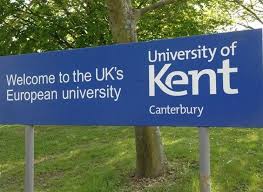
For want of a nail the shoe was lost.
For want of a shoe the horse was lost.
For want of a horse the rider was lost.
For want of a rider the message was lost.
For want of a message the battle was lost.
For want of a battle the kingdom was lost.
And all for the want of a horseshoe nail.
As I reflected on the events that are unfolding at the University of Kent this past week, I was reminded of the proverb quoted above. This reminds us how small things can have far-reaching consequences. The organisers of Lambeth 2020 wanted to smooth over what they may have thought was a relatively minor problem — one which could cause potential offence to some of the bishops due to attend the Lambeth Conference. A decision was made not to invite a small number of episcopal partners who are in same sex relationships. This fateful decision has now blown up to become a major crisis. The Council of the University of Kent, whose buildings are being used for the Lambeth gathering of bishops from all over the world, have been alerted to the decision that such partners are not being included in the official invitations. As the Secretary General of the Anglican Communion announced publicly on February 15th, ‘it would be inappropriate for same sex spouses to be invited to the conference.’ Wives have always been included in the Lambeth invitations. Clearly there is a blatant discrimination at work in this statement.
None of us know exactly how this decision was arrived at. In all probability it was a pragmatic decision which avoided, seemingly, giving offence to those who maintain ‘biblical’ objections to such relationships. If these same-sex partners are left at home, this thinking might have reasoned, the Conference can pretend that same-sex partners do not exist. Anglicans are quite good at this kind of thinking. If a problem, such as the continuing needs of the sexually abused, is buried, then everyone can pretend that it does not exist. Making sure that only heterosexual relationships are visible at Lambeth preserves the myth that only orthodox and ‘biblical’ marriage is to be found within the Communion and its bishops.
Excluding a small number of same sex spouses might have been, from a pragmatic point of view, a price worth paying to preserve harmony and unity at the 2020 Lambeth gathering in Canterbury. Surely everyone recognises that although a few people might protest, this action is not illegal. The Equality Act of 2010 certainly allows for the Church to make such distinctions between hetero and homosexual partners. This calculation seems to have been a miscalculation and protests began almost immediately it became known. What began as a small nail being lost, started to become a massive headache for the conference organisers. Although it is not uncommon for people to expect a degree of discrimination against gay partnerships in the churches, this attitude is far from universal. One particular factor in the protests and debates that have followed this Anglican decision is the siting of the Lambeth Conference gathering in a university campus. The one segment of the population that will never easily acquiesce in the conservative rhetoric about gay relationships are students. Enormous amounts of money are spent across the world promoting the anti-gay message of the religious Right in the States and countries like Uganda. Very few however among the under-30 generation are impressed by this message and they normally will not tolerate what they see simply as homophobia. Even if church authorities argue their right to discriminate according to the religious exemptions of the Equality Act, students will not stop making their opinions known. These protests have now come to the attention of the most senior members of the University of Kent and they have issued an official statement.
The letter sent by the Chair of Council and the Vice Chancellor of the University of Kent is a piece of powerful prose. They make it clear that they are not withdrawing their invitation to the Lambeth Conference to their campus but they wish ‘to bring the Council’s concerns to their (the organisers’) attention and discuss the issues’. They also pointedly extend an invitation to the excluded same-sex spouses to come to the campus. This is a ingenious way of allowing honour to be preserved on both sides. The Conference is to go ahead but the uninvited will be welcomed and they will be honoured according to the values of the University. To quote the letter, this welcome places ‘great value on diversity of opinion, open, respectful debate, recognition of difference, and the central role of constructive engagement and dialogue…’ There are many in the Anglican fold who could say Amen to such sentiments, while recognising that there are those who want to turn their backs on such values.
A compromise seems to have been reached which will no doubt protect the Conference for 2020. Conservatives in the Communion can pretend that they have preserved ‘gospel’ boundaries against gay partnerships among the clergy by making these partners invisible. The University by welcoming the ‘invisible’ ones have stood up for humane and liberal values that they feel are central to academic life. The balance of honour may be claimed on both sides. But can it? Can we really say that the organisers of a future conference will be allowed to plan for 2030 without a thorough vetting by the University in advance? The patch up that seems to have been worked out for next year is only that – a patch up. No vice-Chancellor or anyone else involved with the University is going to allow such a situation to occur again. I for one cannot see that the University of Kent will ever allow a future Lambeth Conference to take place unless there is a radical shift towards the liberal values that the University itself embodies. If the Anglican Church is able to move in this direction, then there is a chance that it can meet again on the campus above Canterbury city. If the Church does not move but remains infected by the reactionary values of GAFCON etc, so amply funded by the wealthy foundations of the American Right, the University will simply tell the Conference to look elsewhere for its 2030 gathering.
On practical level the campus at the University of Kent is perhaps the only site possible for a large conference the size of Lambeth. Its relative proximity to the mother cathedral of the Anglican Communion makes it particularly suitable to be a meeting place for 700 bishops and their partners. Also being close to the ancient church of St Martin where St Augustine began his mission in 597 AD gives a further powerful symbolism to this unique expression of Anglicanism. The organisers of Lambeth 2030 will have a choice. Will they insist on doctrinal purity by excluding same sex partners of bishops, or will they accept that all spouses and committed companions of bishops are here to stay? Will they by then understand that faithfulness and commitment is more important in the eyes of God than biological sex? The nail that was lost when a decision was made to limit who comes to Lambeth in 2020 could mark the end of the Lambeth enterprise altogether. The kingdom was lost … all for the want of the horseshoe nail.





